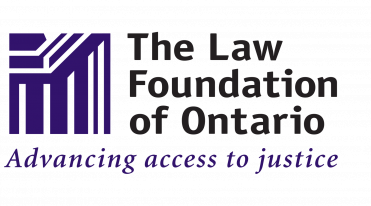
The Law Foundation of Ontario has invested close to $1.4M for 17 new Access to Justice Fund (ATJF) projects. Supported by class action cy-près awards, the ATJF is a unique national fund that provides grants to nonprofit organizations across Canada.
The grants were made from the Foundation’s ATJF Call for Applications in the spring of 2020. The call invited proposals to address the legal needs of Indigenous peoples and refugees, as well as projects focused on public legal education, triage, brief services, and referrals (including tools to assist self-represented litigants).
Pro bono legal help for refugees
Arriving in a new county with unfamiliar laws and processes leaves many refugees in a very vulnerable position. The majority of the ATJF projects funded set out to lessen this vulnerability by supporting refugees to understand and navigate the claims processes.
Through ATJF funding, the Mile End Legal Clinic (Montreal), Halifax Refugee Clinic, and Thunder Bay Multicultural Association are each launching pro bono legal clinics for refugees and non-status migrants in their communities. In collaboration with the Bora Laskin Faculty of Law at Lakehead University, the Thunder Bay clinic is also providing business law services to resettled refugees hoping to establish themselves and secure economic independence in Canada by starting small businesses.
Building on existing programming, the New Brunswick Refugee Clinic and FCJ Refugee Centre (Toronto and southwestern Ontario)are using these grants to improve their capacity to offer online and virtual services and multi-lingual legal education tools, such as the FCJ Refugee Centre’s new Borderless Voices podcast.
With the goal to correct misinformation, the Toronto chapter of the Chinese Canadian National Council will be providing language and cultural-specific trainings to Chinese refugees online and in-person (public health guidelines permitting) in Toronto, Hamilton, Kitchener, Niagara, Ottawa, and York Region.
Culturally informed justice for Indigenous peoples
Colonization and ongoing systemic racism and discrimination continue to have dire effects on the safety, livelihood, and wellbeing of Indigenous peoples across the county. This includes, of course, the significant overrepresentation of Indigenous people within Canada’s criminal justice system. Close to a third of the funded ATJF projects will facilitate culturally informed justice for Indigenous people who have become involved with the justice system.
In Peterborough, the Elizabeth Fry Society is establishing a provincial Indigenous Peoples’ Court. In Thunder Bay, the Nokiiwin Tribal Council is creating more access to Gladue Writers for First Nation communities in northwestern Ontario. In Timmins and Cochrane, Living Space North Against Poverty is working to improve housing outcomes for Indigenous people leaving the criminal justice system and to reduce the length of time spent in custody awaiting bail.
Also, Pro Bono Students Canada (PBSC), in partnership with the Ontario Federation of Indigenous Friendship Centres, will use their ATJF grant to build on a previously funded project to establish two human rights legal clinics at Friendship Centres in Toronto and Ottawa. This project will also pilot a database to track systemic human rights abuses against Indigenous peoples and deliver inter-cultural competency and human rights training for lawyers and PBSC law students.
PLEI for youth, people with disabilities, and self-represented litigants
The remaining funded projects support public legal education and information (PLEI) geared to youth, people with disabilities, and self-represented litigants, plus one novel research project by the East Coast Environmental Law Association is exploring how restorative justice processes might be applied to resolve environmental legal disputes and conflicts.
2020 Access to Justice Fund projects
Access to Justice & Law Reform Institute of Nova Scotia
National Self Represented Litigants Project Atlantic Chapter
$92,764
Anishinabek Nation Union of Ontario Indians
Caring for Our Elders Project
$100,000
British Columbia Civil Liberties Association
Guides to Arrest and Detention: Police Interactions
$100,000
Canadian National Institute for the Blind Foundation
Know Your Rights Atlantic Canada
$75,000
Chinese Canadian National Council Toronto Chapter
Empowering Refugees, Eliminating Barriers, and Combating Misinformation: Supporting Chinese Refugees through Education and Research
$75,000
East Coast Environmental Law Association
Restorative Justice in Environmental Law Project
$18,400
Elizabeth Fry Society of Peterborough
Indigenous Peoples’ Court of Peterborough
$44,930
FCJ Refugee Centre
Borderless Connections
$98,000
Halifax Refugee Clinic
The HRC Legal Triage and Pro Bono Services Coordination project
$96,000
Legal Information Society of Nova Scotia
Youth Legal Help Project
$100,000
Living Space North Against Poverty
Living Space Access & Diversion Project: Improving access to justice for marginalized people in Timmins and the Cochrane District
$100,000
Mile End Legal Clinic
Clinique juridique des réfugiés
$89,000
New Brunswick Refugee Clinic
Website Overhaul and Redevelopment
$24,725
Nokiiwin Tribal Council
Gladue Report Writer
$100,000
Pro Bono Students Canada
Indigenous Human Rights Program
$100,000
Reach Canada
Increasing Legal Referrals Through Front-line Workers
$84,464
Thunder Bay Multicultural Association
Northern Ontario Legal Clinic for Migrants and Refugees
$100,000
About the Access to Justice Fund (ATJF)
The Law Foundation of Ontario’s Access to Justice Fund (ATJF) is a distinct and permanent fund that makes grants to projects that improve access to justice across the country. The Foundation created the ATJF in 2009 after receiving a $14.6 million cy-près award from Cassano v. TD Bank. To date, the ATJF has received 22 cy-près awards and supported more than 253 grants worth close to $27.1 million.
Courts continue to approve The Law Foundation of Ontario as a fitting and accountable recipient of both fixed and residual cy-près awards given its experience and expertise in granting, broad access to justice mandate, and prudent financial management. This allows the Foundation to develop additional calls for funding and make grants through the ATJF.


